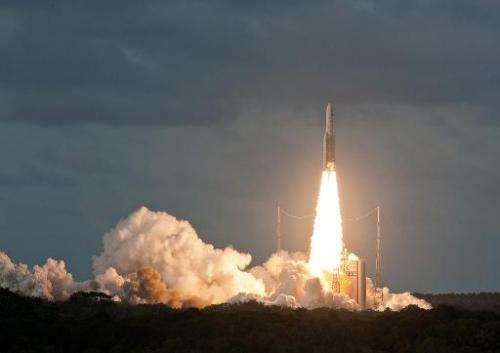Europe to resume satnav launches in March: Arianespace

Europe in March will resume satellite launches for its troubled Galileo navigation system, hoping to boost by at least six the number of orbiters this year, Arianespace and the European Commission said Wednesday.
"We are ready for a launch on March 26" from Kourou, Europe's space base in French Guyana, chairman Stephane Israel of launch firm Arianespace told AFP in Paris after the European Commission in Brussels gave the green light.
Galileo, Europe's seven-billion-euro ($8-billion) rival to America's GPS, has suffered a number of setbacks. Last August, two satellites were sent astray by a mislaunch blamed on frozen rocket fuel pipes.
The pair were to have been the fifth and sixth orbiters in what will ultimately be a 30-satellite constellation.
Arianespace subsequently announced that the launch of two more Galileo satellites, due last month, had been indefinitely postponed.
The fifth and sixth satellites had been sent aloft on board a Russian Soyuz rocket, the same type that will likely be used for the March launch.
The European Space Agency (ESA) said in October it wanted "additional time to test the two Galileo satellites before resuming deployment" of the constellation.
Elzbieta Bienkowska, European Commissioner for Industry, announced at the seventh Annual European Space Conference in Brussels Wednesday that launches will resume.
The commission fully finances the Galileo programme.
"We agreed to resume launches in March," she said in a prepared speech, a copy of which was given to AFP. "We aim to launch at least six satellites this year."
Bienkowska said the objective was to provide early Galileo services "by 2016, at the latest", and full services "by 2020".
"We had a setback. But we will go forward again," the commissioner said.
"I am determined to put the Galileo programme back on track. I am determined to deliver services on time and on budget."
The remaining satellites will be launched using a combination of Russian Soyuz rockets, which can take two aloft at a time, and Europe's Ariane 5 ES launcher, which can handle four.
Contracts have been signed for five Soyuz launches and three with Ariane 5 ES.
The Galileo satellites have yet to pass compatability tests for launch on Ariane—a process that could take several more months.
A Soyuz lifted four satellites for Internet data provider O3b in December—successful despite a worrying break in communication.
ESA said in December that contact had been established with the mislaunched fifth Galileo satellite, which has been nudged into a "more suitable orbit for navigation purposes" and may not be completely lost to the system.
© 2015 AFP



















